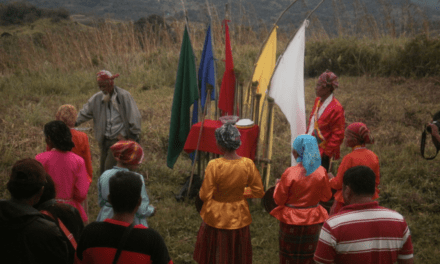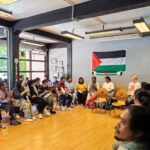by Nicola Bullard & Tadzio Müller
GAIA: Global Anti-Incinerator Alliance/Global Alliance for Incinerator Alternatives
Who is in it? What is the purpose?
GAIA is a worldwide alliance of more than 650 grassroots groups, non-governmental organizations, and individuals in over 90 countries whose ultimate vision is a just, toxic-free world without incineration.
GAIA’s greatest strength lies in its membership, which includes some of the most active leaders in environmental health and justice struggles internationally. Since 2009, wastepicker groups from Asia and Latin America, organised around the Global Alliance of Wastepickers, have teamed up with GAIA to make a case at the UN climate change talks for recycling rather than burning or burying waste. Despite wastepickers earning livelihoods from recovery and recycling — which reduces demand for natural resources andgreenhouse gas emissions — their successes are being undermined by “waste-to-energy” incinerators and landfills. Until 2009, they were notably absent from climate change discussions.
What is it doing?
GAIA’s members work through a combination of grassroots organizing, strategic alliances, and creative approaches to local economic development. GAIA shares information online and in regional meetings, conducts coordinated campaigns toward common goals, strategizes together by participating in international trainings and skill-shares, and provides a community of support for each other.
In partnership with the Global Alliance of Wastepickers, GAIA has organized events in Bonn, Germany at the June 2009 intersessional meetings and released a statement. GAIA presented the relationship between waste and wasting to climate change, the role of wastepickers and local initiatives that can help in emission reduction goals. This partnership attended the COP-15 in Copenhagen, the COP-16 in Cancun, as well as intersessionals. GAIA has intervened on the climate policy level a number of times, including before the Clean Development Mechanism Executive Board and the Transitional Committee for the Green Climate Fund.
What are your main objectives and demands? What are your main proposals for addressing climate crisis?
GAIA’s international network is organizing to support community-based movements for environmental justice, zero waste, and real climate solutions. We believe that a zero waste approach to managing our resources addresses the root causes of global warming while safeguarding human health and dramatically reducing our demand on natural resources.
Our main proposals to address climate crisis are as follows:
Global Justice: We only achieve true solutions when our work supports systems of social and economic justice and ecological sustainability.
Zero Waste: Zero waste means reducing what we trash in landfills and incinerators to zero.
Waste Picker Rights: In many parts of the developing world, collecting and sorting waste “informally” provides a livelihood for large numbers of the urban poor, who often work in deplorable conditions.
Clean Production: Clean Production is a way of designing products and manufacturing processes in harmony with natural ecological cycles.
Extended Producer Responsibility: To get to the root cause of waste, communities need to stop picking up after the producers of products that become waste and begin demanding that they do so themselves.
Specific campaign objectives include: ending the support of climate subsidies (carbon credits, renewable energy standards, etc) for incinerators and landfills; and generating public funding support for zero waste systems that are inclusive of the informal recycling sector.
What are your successes?
GAIA’s members are stopping incinerators and promoting alternatives through a combination of
- Grassroots organizing: building a powerful movement that has grown to include more than 650 organizations and networks in more than 90 countries.
- Strategic alliances: the partnership with the Global Alliance of Wastepickers and Allies has put waste issues in the climate waste agenda and led to significant victories at the climate policy arena, especially around the CDM.
- Stopping waste incinerators: GAIA members have stopped 150 incinerators in 25 countries.
More information see here: http://www.no-burn.org/section.php?id=75
What are the main challenges, especially in terms of building a broader and more stable base for your proposals?
Our main challenge is the trend towards privatization, corporate-led and techno-enthusiastic waste management, which in alliance with a corrupt and increasingly weakened political elite, ignores and undermines the community-based, environmental justice led approaches to waste management.
In this context, the role of the informal sector in resource recovery and associated climate change mitigation is largely overlooked in developing countries. Waste pickers require support to form cooperatives and organizations, access better equipment, negotiate direct access to waste sources, and generally improve their health, safety, and livelihoods.
At the global level, the funds and resources dedicated to solving the climate crisis are not only inadequate in scale but often misdirected towards waste-to-energy in the form of carbon credits or other kinds of subsidies.
Our current mismanagement of our waste is both a travesty and an opportunity. A travesty because it is polluting itself, and drives increased consumption and destruction of natural resources, benefiting private corporations and draining wealth from communities.
But it is also an opportunity: community-led Zero Waste offers the opportunity to reduce pollution, reduce demand for energy and raw resources, and increase local employment and community resilience.
LA VIA CAMPESINA
Who is in it? What is the purpose?
La Via Campesina was founded in 1993 in Mons, Belgium. At that time, agricultural policies and agribusiness were becoming globalized and small farmers needed to develop and struggle for a common vision. Small-scale farmers’ organizations also wanted to have their voice heard and to participate directly in the decisions that were affecting their lives. In 2011, La Via Campesina is now an international movement bringing together millions of peasants, small and medium-size farmers, landless people, women farmers, indigenous people, migrants and agricultural workers from around the world. Its members include about 150 local and national organizations in 70 countries from Africa, Asia, Europe and the Americas. Altogether, it represents about 200 million farmers. It is an autonomous, pluralist and multicultural movement, independent from any political, economic or other type of affiliation.
The main goal of the movement is to realize food sovereignty and stop the destructive neoliberal process. It is based on the conviction that small farmers, including peasant fisher-folk, pastoralists and indigenous people, who make up almost half the world’s people, are capable of producing food for their communities and feeding the world in a sustainable and healthy way. The movement defends women rights and gender equality at all levels. It struggles against all forms of violence against women.
What are the main objectives and demands?
Via Campesina launched the idea of food sovereignty at the World Food Summit in 1996. This idea has now grown into a global people’s movement carried by a large diversity of social sectors such as the urban poor, environmental and consumer groups, women associations, fisher-folks, pastoralists and many others.
Food sovereignty is the right of peoples to healthy and culturally appropriate food produced through sustainable methods and their right to define their own food and agriculture systems. Food sovereignty prioritizes local food production and consumption. It gives a country the right to protect its local producers from cheap imports and to control production. It ensures that the rights to use and manage lands, territories, water, seeds, livestock and biodiversity are in the hands of those who produce food and not of the corporate sector. Therefore the implementation of genuine agrarian reform is one of the top priorities of the farmer’s movement.
What are the main proposals for addressing climate crisis?
La Via Campesina advocates food sovereignty as one of the most powerful responses to the current food, poverty and climate crises. Some key climate and system-related demands from Via Campesina Africa region include:
- The global food system currently generates between 44 and 57% of global greenhouse gas emissions, almost all of which could be eliminated by transforming the food system based on the principles of agro-ecology, agrarian reform and food sovereignty.
- In order to adapt to a changing climate we need the greater resiliency of diversified agro-ecological systems (and water conservation and harvesting, watershed management, agro-forestry, ground cover, etc.) and the genetic diversity of local peasant seeds and peasant seed systems.
- An end to trade liberalization and the renewed protection of domestic markets so that African farmers can receive the fair prices that will enable us to boost production and feed our peoples.
- Comprehensive programs to support agroecological farming by small holders and to rebuild food sovereignty, including genuine agrarian reform and the defense of peasant lands from land grabbing, the reorientation of government food procurement from agribusiness toward purchasing ecological food at fair prices from small holders, and programs of production credit for small holders engaged in ecological farming instead of subsidies tied to chemical fertilizers and pesticides.
Globally, Via Campesina’s key demands of the climate negotiations are:
- Affirm the principles of the Peoples’ Accord in Cochabamba.
- Establish a binding agreement to reduce by 50 percent greenhouse gas emissions in industrialized countries by 2017.
- Allocate six per cent of developed countries’ GDP to finance actions against the climate crisis in countries of the global south.
- Total respect for human rights, indigenous peoples’ rights and rights of climate migrants.
- The formation of an International Tribunal for Climate Justice.
- State policies to promote and strengthen sustainable peasant agriculture and food sovereignty.
What are its successes?
First and foremost, La Via Campesina continues to grow and gain strength as an international movement of small-scale agricultural producers. It is recognised as a main actor in the food and agricultural debates and is heard by institutions such as the FAO and the UN Human Rights Council, and is broadly recognized among other social movements from local to global level.
Second, the key demand of LVC – food sovereignty – has gained wide recognition as a systemic alternative to industrial agriculture. High-level analysts and policy-makers – from the UN Rapporteur on the Right to Food through to the International Assessment of Agricultural Knowledge, Science and Technology for Development (IAASTD) – have acknowledged food sovereignty as both viable and necessary.
What are the main challenges, especially in terms of building a broader and more stable base for your proposals?
There are many tensions to be resolved in the transition from industrial agriculture to food sovereignty, not least how to overcome the power of agri-business and the perception that expansion of industrial agriculture is the only way to feed the world. In the climate negotiations, it is evident that some sectors and countries are eager to see the expansion of the CDM to include agriculture. It is also a challenge to build alliances with urban sectors and workers organisations who do not see agriculture and food production as their key concerns.
THAI WORKING GROUP FOR CLIMATE JUSTICE (TCJ)
Who is in it? What is the purpose?
Established in early 2008, the Thai Working Group for Climate Justice or TCJ is a coalition of Thai non-governmental organizations and individual activists whose work areas interconnected with climate justice. Members of the coalition work closely with various community groups and grassroots movements across the country whom TCJ has identified as its networks.[1] The main thematic areas currently covered by TCJ members and networks are: energy and industrial development, forest and land reform, and food security (agriculture and fishery).
TCJ’s main purposes are to promote justice aspects of the climate debate in the Thai society and to advocate for climate justice to become part of the national climate policy, planning, and implementation. Equally important, the aim is to create and facilitate political space for community groups and grassroots movements in order to construct climate justice from the ground. At the same time, TCJ hopes to contribute to the regional and international climate justice movements.
What does it do?
In campaigning, TCJ works to empower Thai civil society on ‘climate justice’ debates and to raise public awareness. TCJ organizes public forums, including around the COPs, to stimulate and develop climate justice discussions in the Thai society as well as facilitating dialogues and establishing communication channels between concerned government agencies and grassroots movements. One of the outcomes of a public forum in 2009 was a set of recommendations from civil society for the Thai Government’s positions at the COP 15 (Copenhagen) for which it continues to advocate. Representatives of TCJ have participated in COPs as NGO observers as well as taken part in civil society campaign activities, particularly with CJN!, around the COPs
What are the main objectives and demands?
TCJ’s general demands/position toward the international climate negotiations and the Thai government are:
- The key principles of climate policies and solutions must be: justice, equity, the precautionary principle, historical responsibilities and common but differentiated responsibilities.
- Climate policy making shall ensure people’s participation.
- Genuine climate solutions should enhance a ‘livable and sustainable society’ and are not limited to a low-carbon perspective.
- Genuine climate solutions shall address voices of communities/grassroots movements and respect and recognize their rights to natural resources, land, and livelihood; and shall enhance local and traditional knowledge as a sustainable path toward communities’ climate resilience.
- Developed countries must reduce their GHG emissions domestically and immediately. At the same time they must pursue ambitious mitigation targets and these targets shall be made legally binding.
- Developing countries must formulate and genuinely implement transparent emission reduction policies.
- Thailand needs to have voluntary emission reduction targets that should be domestically binding.
What are your main proposals for addressing climate crisis?
- The world needs to shift from fossil fuels based economy toward a more sustainable and livable society – this requires significant changes in the development paradigm. In transition, an energy revolution for decentralized renewable alternatives based on local resources should be the focus.
- Support sustainable and organic farming based on local resources and livelihood instead of agro-industries as a mitigation pathway and sustainable adaptation measure as well as building climate resilience for agricultural sector while taking into account food security and biodiversity preservation.
- Discouraging the use of carbon markets and carbon offsets since they have been used to avoid direct domestic emission reduction. Focusing on real emission reduction, not false/unproven/non-sustainable solutions e.g. carbon offsets, clean coal, carbon capture and storage, nuclear energy. Opposing introduction of forests, especially those being managed by communities/indigenous people, to carbon market; in particular REDD/REDD+ mechanisms.
- Communities and areas most vulnerable to climate change impacts should be identified and prioritized in adaptation and building resilience.
What are your successes?
In 2010, TCJ and its networks rejected Thailand’s National Master Plan on Climate Change in 2010 and called for redrafting with genuine public participation. This campaign was successful and the redrafting process, including public hearings, began in May 2011 and is ongoing as of September 2011. TCJ has built awareness concerning climate justice within the Thai civil society and grassroots movements and has stimulated climate justice discussions in the general climate change debate.
What are the main challenges, especially in terms of building a broader and more stable base for your proposals?
Moving away from fossil fuels based economy is something quite unimaginable for most urban people and policy makers. In addition, the influence of big energy and various corporations (either private or public, multinational or national) remains significant. To a large extent, society still lacks understanding of the root causes of climate change therefore they do not understand the need for system change (for example, the relationship between consumption and climate change is not understood). The problem-solving paradigm of relevant government agencies has been very technical, conservative, and rigid. In the other hand, most grassroots movements and community groups actively join or take action on climate issues only when it helps with their specific struggles.
1. Current key member organizations include: BIOTHAI Foundation, Ecological Alert and Recovery – Thailand (EARTH), Focus on the Global South, Foundation for Consumers, Foundation for Ecological Recovery (FER), Foundation of Reclaiming Rural Agriculture and Food Sovereignty Action (RRAFA), NET (Surin) Foundation, Nuclear Watch, Project for Ecological Awareness Building, and Sustainable Agriculture Foundation. TCJ’s “networks” include Alternative Agriculture Network, Assembly of the Poor, Community Forest Network, Federation of Southern Local Fisherfolks, Indigenous People Network Thailand, Land Reform Network Thailand, Northern People’s Network on Natural Resources, Southern Youth Network on Local Fisheries, Women Network, and local movements against fossil and nuclear energy and industrial development.
KB!N: KLIMA!BEWEGUNGSNETZWERK, GERMANY
Who is in it? What is the purpose?
The Klima!Bewegungsnetzwerk (KB!N or Climate Movement! Network in English) emerged from the first climate action camp in Germany which took place in the summer of 2008 in Hamburg. The camp was organised by a small group of people committed to developing a radical left position around climate change together with the larger and more established anti-racist movement. Although this worked well, it was clear that there was a need to create an organisational framework for a climate justice position in Germany, which is how the KB!N came into being. This loose network organises a number of groups and individuals from the ‘radical left’, some coming from a more autonomous tradition (i.e. with very few clear internal structures) and others that, while not exactly parties, have some party-like structure. What ties them together is their concern for developing a politics of climate justice in Germany; that is, convincing the left that they should think more about environmental issues and convincing the environmentalists that they should think more about a critique of capitalism
What is it doing?
All of the political actors in KB!N had grown up with summit protests, which meant that after the 2008 climate camp, the next big project was to mobilise people towards the COP15 in Copenhagen, based on a conviction that the COPs won’t deliver climate justice. In this mobilisation, one of the key challenges was to get the much older and larger anti-nuclear movement interested in climate justice. Although this was largely achieved, the problem was that after Copenhagen climate change as an issue pretty much disappeared from the political agenda, both of the ‘general public’ and for much of the activist left. For KB!N, this meant figuring out what climate justice meant in Germany beyond the big summits. Over the last two years, three different answers have been given to this question, all of which have been reflected in the work of groups affiliated with KB!N:
- local fights against major emitters: primarily in and around Cologne and Berlin, groups have been fighting lignite and coal mining, as well as carbon capture and storage ‘pilot projects’, working with local initiatives and organising climate camps.
- organising around mobility (Tübingen, Bremen): bringing together climate and other social justice issues, a number of campaigns emerged that tried to bring together a classic environmental issue (climate change) with a classic left/social-democratic issue (free public transport) and to develop a critique of (German) car-society. The hope was that people’s interest in free public transport would be stronger than their scepticism of environmentalism.
- organising around public utilities and the question of democracy: after the orgy of privatisation and the increasingly dubious role that some public utilities play in the energy sector, the question of who owns these utilities and how to get them back under public control has re-emerged as a focus of organising. While this is an extremely promising avenue in terms of political outcomes, the question emerges what the specific political contribution is of a ‘radical’ group like KB!N in a context where the processes are dominated by more moderate NGOs.
What are your main objectives and demands? What are your main proposals for addressing climate crisis?
KB!N’s general demands are essentially those that the network Climate Justice Action (CJA) deployed in the COP15 mobilisation, which were in turn a slightly modified version of the demands articulated by Climate Justice Now! (CJN!) in Bali in 2007. (http://www.climate-justice-now.org/em-cjn/mission/). Each particular group in the network also works with a set of more specific, local demands: the groups active in Western Germany are working on phasing-out of lignite mining, although elsewhere things are not as clear. The group feels the need to refocus on core climate justice issues but the challenge is to get others, such as the anti-nuclear movement, to take up these issues.
What are your successes?
The major success preceded the actual formation of the network: the 2008 climate camp in Hamburg received an enormous amount of media attention and put the issue of climate justice on the agenda, beyond the usual Greens and NGOs. Most significant was being able to convince the (radical) left that climate change was an important strategic issue for a left-wing politics that should not be left to the Greens. KB!N also mobilised several thousand people to Copenhagen, many of whom had not before engaged with climate justice debates. Unfortunately after Copenhagen, the issue of climate change went underground and was replaced by a renewed focus among activists on the struggle against nuclear power. KB!N has also been part of a successful push against the expansion of lignite mining and its use in power plants. In addition, KB!N has contributed to making CCS impossible in Germany, which might have significant repercussions worldwide.
What are the main challenges, especially in terms of building a broader and more stable base for your proposals?
The key questions that confront KB!N are:
- How do we connect the issue of climate change and climate justice to the other big issues, in particular the economic crisis? How do we clarify that we cannot work on one without also tackling the other?
- How do we mobilise lots of young people, as the British Camp for Climate Action (see below) has managed to do?
- What is our specific radical contribution in a field dominated by larger but more moderate actors? On the other hand, how do we work with very specific, local actors without losing our general perspective?
- How do we overcome people’s apparent paralysis in the face of the news of extreme weather events and the figures and projections that get worse every day?
CAMP FOR CLIMATE ACTION, UNITED KINGDOM
Who’s in it? What’s the purpose?
The Camp for Climate Action (CfCA) was formed in 2006 in the UK by activists from the ecological direct action movements and parts of the anti-authoritarian, anti-capitalist Dissent! network that had mobilised around the G8-summit in Gleneagles, Scotland and created the Eco-Village in Stirling. The idea was to bring together ecological concerns, especially about climate change, with left politics focused more on a critique of the socio-economic system. Prior to that, climate discourse in Europe had been dominated by NGOs who tended to focus on narrow issues – characterised as “lightbulbs and lifestyles” – and who generally viewed the official UN-negotiating process as the only way forward. In contrast, the (European) summit protest movements were very critical of international institutions, as well as of some NGOs, and wary of state power. There was a certainty that governments and climate talks would not deliver because corporate lobbies were calling the shots. At the same time, there was a sense that summit protests were suffering from ‘diminishing marginal returns’ and that they were becoming ritualised. The idea behind organising a climate camp was to set the agenda and act rather than always reacting.
What is it doing?
CfCA first and foremost took the form of an annual camp outside a major emitter of greenhouse gases. People came from all over the country to create these camps whose three central pillars were to:
- engage in direct action against the root causes of climate change
- build a social movement to deal with the root causes of climate change
- be an example of sustainable, low-impact living (in other words, taking the idea of ‘prefigurative politics’ as far as possible)
These annual camps ended up being a ‘hothouse’ for building and sharing activist skills and abilities: they allowed people to get involved in a safe space where they could share and develop skills that often resulted with them deciding to take radical action. For example in 2009, during the ‘climate swoop’ on a major coal-fired power plant, a much larger number of people than expected got involved in tearing down fences.
CfCA also tried, somewhat successfully, to build a national organisation from local ‘neighbourhoods’ that met outside the yearly cycle of the camps. These ‘neighbourhoods’ would take their own actions and feed into the national process. Although it was decided in 2011 to no longer organise a central national camp, some of these local/regional structures are still going strong.
What are your main objectives and demands? What are your main proposals for addressing climate crisis?
The structure of CfCA as a consensus-based network and its oppositional nature meant that it never developed a clear set of demands. There was a strong rejection of state- and market-led policies and a strong agreement that there is a plurality of solutions. In the tradition of climate justice, CfCA was convinced that the “one-size-fits-all” approach is a mistake, as this would necessarily ride roughshod over the needs and realities of particular communities. From an initial focus on a rejection of fossil fuels, in 2009 CfCA decided to target the link between financialised capitalism and the climate crisis, when it chose to organise a climate camp outside the European Climate Exchange in London.
Another reason why CfCA did not develop a clear set of demands was that it tended to be very action-focused, which meant that it faced dramatic constraints both in terms of time and of state repression. A desire to come up with demands was superseded by the need to set up a camp. But it was also because participants believe in multiplicity. The CfCA is not in a position to develop a 5-year plan. The camps are about interaction and discussion and the idea was that solutions would ‘bubble up’ from there.
What are your successes?
There are four key successes that can be ascribed to CfCA. First, it played a major role in preventing the construction a third runway at Heathrow, meaning that a major new piece of carbon-emitting infrastructure was not rolled out, which would have committed the UK to several more decades of increasing carbon emissions. In addition, it was a real social justice success as the adjacent village, where largely working class families lived, was saved from destruction.
Second, CfCA was involved in preventing the construction of the UK’s first new coal-fired power plant in thirty years at Kingsnorth.
Third, CfCA was central to the emergence of a vibrant intergenerational network of activists who are extremely active in today’s social movements in the UK. Many contemporary protests benefit from the interconnections that were developed while people worked on building the climate camps.
Finally, the CfCA contributed to building systemic critique of climate change that goes beyond a narrow focus on the fate of polar bears.
What are the main challenges, especially in terms of building a broader and more stable base for your proposals?There were two main challenges that the CfCA constantly struggled with, and never fully overcame.
The CfCA failed to embed the struggle in a class- and race-based perspective, beyond a fairly general critique of capitalism as the prime cause of climate change. In terms of participants, it remained a largely white and middle-class movement, albeit politically radical.
It also reached a limit in the ‘carrying capacity’ of the open, horizontal network-process that CfCA was using. This meant that anyone could show up to a meeting and have an equal-weighted voice. That was both amazing, and very difficult to manage.








